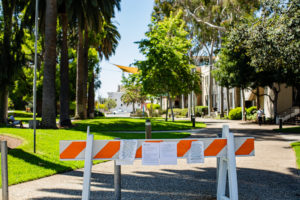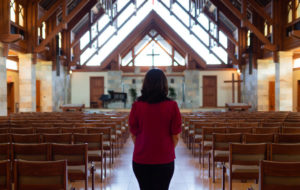Catholicity, Social Distancing and Undocumented Migration
Posted 07/28/2020 in Missiology Conversations, Responses To World Events
The following is a guest post written in anticipation of the 2020 Missiology Lectures: Migration, Transnationalism, and Faith in Missiological Perspective: Los Angeles as a Global Crossroads – learn more + register here
 The global Covid-19 pandemic is the type of event that characterizes an epoch because it is changing our understanding and experience of what we have defined, and taken for granted, as “normal life”. Arguably the most distinctive concept of the first response to this virus around the world has been “social distancing”, a practice that is so foreign to the cultures and faiths of many peoples. Distancing is about separation and even exclusion and this is certainly opposite to the dynamic of catholicity, which is also about wholeness in diversity, including and embracing everybody because we believe that nobody is outside the reach of God’s mercy and tenderness revealed in Jesus Christ. And yet today we are called to practice distancing in order to protect the “whole”, which is our communities and humankind in general. Can we do it?
The global Covid-19 pandemic is the type of event that characterizes an epoch because it is changing our understanding and experience of what we have defined, and taken for granted, as “normal life”. Arguably the most distinctive concept of the first response to this virus around the world has been “social distancing”, a practice that is so foreign to the cultures and faiths of many peoples. Distancing is about separation and even exclusion and this is certainly opposite to the dynamic of catholicity, which is also about wholeness in diversity, including and embracing everybody because we believe that nobody is outside the reach of God’s mercy and tenderness revealed in Jesus Christ. And yet today we are called to practice distancing in order to protect the “whole”, which is our communities and humankind in general. Can we do it?

A Twitter video by undocumented Filipino-American journalist Jose Antonio Vargas (April 11, 2020) reflects on social distancing observing that undocumented people do not have to adapt to this situation because social distancing is their daily reality. What we now consider as something new and unfamiliar represents “normal life” for millions of people around the world who because of their lack of documents are forced to live apart from their families or have been forcibly separated from them as it is happening to thousands of immigrant children at the Southern US border. To those who rightly complain because they cannot visit with their families, who feel the pain and suffering of distancing and separation, who have not been able to grieve the deaths of their loved ones, who feel uncertain about the present and the future as never before…welcome to the world of undocumented migrants!
“What we now consider as something new and unfamiliar represents ‘normal life’ for millions of people around the world”
 The hope is that this epochal event, which is bringing so much affliction and uncertainty to our “normal lives”, will bring us close together, but not only with those who “normally” sit at our tables, but especially with those who are “normally” left distant and often are not even included in what is usually defined as “we”. If catholicity is also about wholeness, we will never be “whole” if we do not walk the path of “radical kinship” (Gregory Boyle), which is God’s path because in Jesus ‘incarnation God shows us the way toward wholeness, inclusion, kinship, in other words, catholicity.
The hope is that this epochal event, which is bringing so much affliction and uncertainty to our “normal lives”, will bring us close together, but not only with those who “normally” sit at our tables, but especially with those who are “normally” left distant and often are not even included in what is usually defined as “we”. If catholicity is also about wholeness, we will never be “whole” if we do not walk the path of “radical kinship” (Gregory Boyle), which is God’s path because in Jesus ‘incarnation God shows us the way toward wholeness, inclusion, kinship, in other words, catholicity.
Vargas affirms that his is “a note of encouragement”: despite the separation, the uncertainty, the pain, undocumented migrants show that we can do it and we can do it together because God created us to belong together. And through this message of encouragement these migrants become the “prophets of catholicity” in the era of Covid-19.
 Gioacchino Campese is Professor of the Theology of Human Mobility at Pontifical Urbaniana University, Italy and will be lecturing on “Catholicity: Migration, Religion, and World Christianity” at the 2020 Missiology Lectures.
Gioacchino Campese is Professor of the Theology of Human Mobility at Pontifical Urbaniana University, Italy and will be lecturing on “Catholicity: Migration, Religion, and World Christianity” at the 2020 Missiology Lectures.

